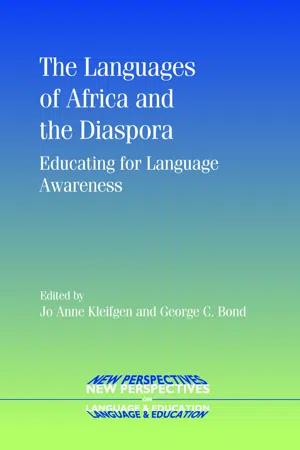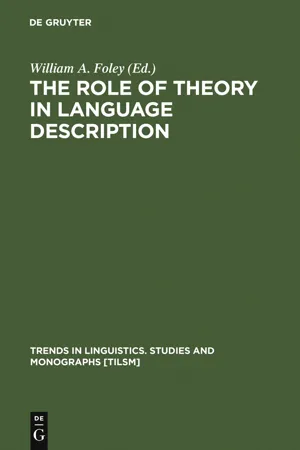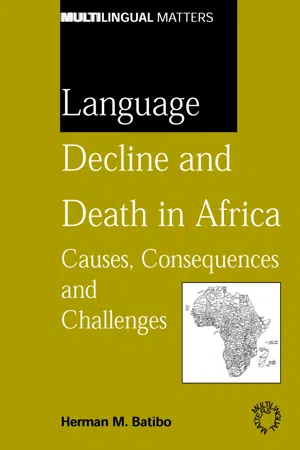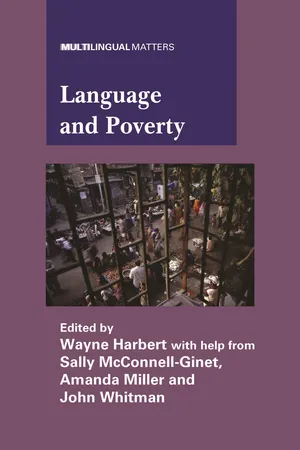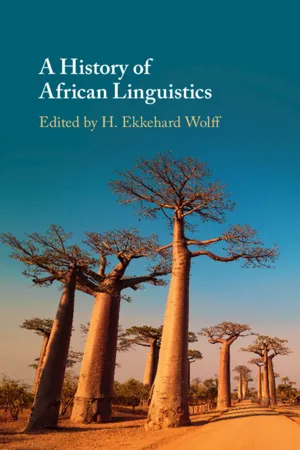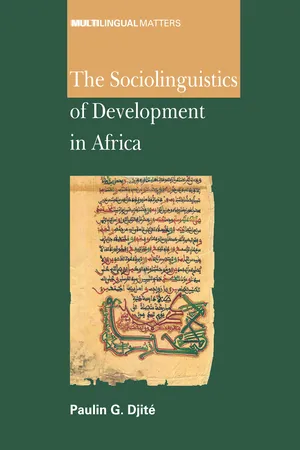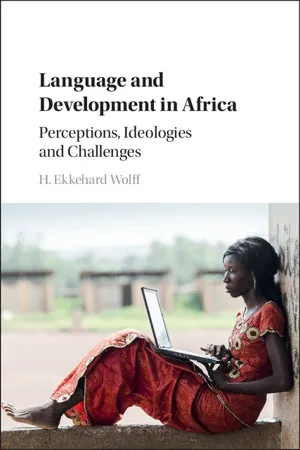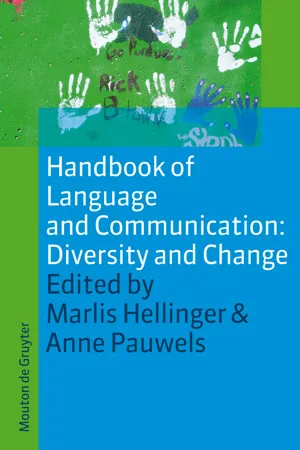Languages & Linguistics
African Countries Speaking English
"African Countries Speaking English" refers to the African nations where English is an official or widely spoken language. These countries include Nigeria, South Africa, Kenya, Ghana, and others. English is often used as a second language in education, government, and business, reflecting the historical influence of British colonization and the global importance of English as a lingua franca.
Written by Perlego with AI-assistance
Related key terms
1 of 5
8 Key excerpts on "African Countries Speaking English"
- eBook - PDF
The Languages of Africa and the Diaspora
Educating for Language Awareness
- Jo Anne Kleifgen, George C. Bond, Jo Anne Kleifgen, George C. Bond(Authors)
- 2009(Publication Date)
- Multilingual Matters(Publisher)
This sense of the inappropriateness of African language as a medium of conveying knowledge in the formal classroom continues to be a widespread perception among African parents. As independence swept across the African continent in the second half of the 20th century, the influence of the discourse of linguistic diversity as both exotic and anachronistic continued. The economic and political agenda of African states’ new Western partners continued to favour the primacy of non-African languages and cultures in the continent’s sociocultural development. At the Conference of African States on the African Perspectives on Linguistic Diversity 37 Development of Education in Africa (1961), ministers of the newly-independent African nations presented their hopes for a uniquely African education that would include serious attention to cultural and linguistic diversity. In response, their Western partners at the conference emphasized the need to refashion African education to match their own vision for economic development – a vision that revolved around global realities, not African ones. In the end, recognition of cultural and linguistic diversity failed to appear on the international agenda for the development of African education. So it has been that post-colonial governments have maintained and even extended the position of European languages in national education and political systems. Adegbija analyzes the post-colonial place of European languages in this way: Post-colonial policy makers in Africa have largely rubber-stamped or toed the line of language and educational policies bequeathed to them by the colonial masters ... . Educational systems, which have widened and extended beyond what they were in colonial days, have been further used to entrench and perpetuate the feeling of the inviolable worth of colonial languages. (Adegbija, 1994: 33–4) In this environment, linguistic diversity becomes a characteristic to ignore as far as possible. - eBook - PDF
- William A. Foley(Author)
- 2011(Publication Date)
- De Gruyter Mouton(Publisher)
The discussion will focus on the post-independence period. 1. The importance of language in the African states In Africa there is a general realization that language is a vital resource as a tool of socio-economic development, as an instrument of promoting national culture and development, and as a basis of the legitimacy of the 422 Mohamed Η. Abdulaziz nation-state. On the negative side given the multi-ethnic, multilingual nature of many African countries, language is seen as one of the most delicate factors in the effort to build harmonious nationalities. In fact current civil wars in Africa have their roots not, as it might appear, in ideological differences, but in ethnic cleavages which give rise also to corruption, nepotism and lack of national commitment, as opposed to ethnic solidarity. This fact has amply been dealt with in sociolinguistic literature. The interesting fact is that different African countries, many with similar sociolinguistic situations, have adopted different solutions to the problems, with successful or disastrous effects. For example, with regard to the issue of language and nation, there are the following situations: 1.1 Typology of language situations (1) nations having one African language spoken by the vast majority of the population: (a) as a mother-tongue: Somalia (Somali), Lesotho (Sesotho), Rwanda (Kinyarwanda), Swaziland (Seswati), Burundi (Ki-rundi), Botswana (Setswana), Egypt, Libya, Tunisia, Algeria, Morocco (all with Arabic as the predominant mother-tongue); (b) as a lingua franca: Kenya, Tanzania (Kiswahili), Central African Republic (Sango), Mali (Bambara), Senegal (Wolof — 35% native speakers), Sudan (Arabic — 54% native speakers), Ethiopia (Amharic). Nations in group (a) would seem to have a very favorable situation for developing African national/ official languages. - eBook - PDF
Language Decline and Death in Africa
Causes, Consequences and Challenges
- Herman M. Batibo(Author)
- 2005(Publication Date)
- Multilingual Matters(Publisher)
Inter-ethnic movements and interactions through trade, working places and intermarriages have promoted the use of a lingua franca to facilitate communication. In some countries smaller groups tend to depend on larger groups for a livelihood, and thus readily adopt the language used by the latter. There is a growing tendency to marginalise the small languages as many of their roles are taken over by the bigger languages; hence their use becomes restricted to communication at family and village level and to cultural expression. In most cases, only the older people use them on a regular basis as the younger generation tend to use the ex-colonial language or the dominant language. With the expansion of Arabic in countries which border the Arab world or where people want to associate their linguistic and cultural identity with their Muslim faith, there is a possibility of considerably more expan-sion of this language, hence adding to the socio-linguistic complexity of the continent. Finally, the often overlapping roles of the ex-colonial and dominant languages on the one hand, and those of the minority and dominant languages on the other, have brought about a number of socio-linguistic phenomena in many countries. Such phenomena include continuous language conflict, extensive code-switching and code-mixing, massive borrowing from one language by another, language interference, double allegiances, inconsistent or conflicting language policies and, at times, states of indecision on the part of decision-makers. A number of these are considered in more detail in the next section. Status Country National language South Africa, Liberia Second language Swaziland, Lesotho, Zimbabwe, Zambia, Namibia, Malawi, Gambia, Kenya, Uganda, Nigeria, Ghana, Sierra Leone Second/International Cameroon, Ethiopia, Somalia, Tanzania, Botswana International Sudan, Egypt, Mozambique Table 7 The role of English in Africa Source : Smied (1991: 4) - eBook - PDF
- Wayne Harbert, Sally McConnell-Ginet, Amanda Miller, John Whitman, Wayne Harbert, Sally McConnell-Ginet, Amanda Miller, John Whitman(Authors)
- 2008(Publication Date)
- Multilingual Matters(Publisher)
In order to make the analysis and understanding of the South African dynamic as precise as possible, I spend considerable time on the big picture, beginning with our views about the global relation of forces as manifest in the global, regional and national linguistic hierarchies that 53 have evolved over time. In this context, we must keep in mind the kind of caveat that Mufwene (2002: 191) issues when he reminds us that as language planners, we have to take into account the ecologies that make it possible for languages to thrive in their given state. For, as he puts it, if we are going to get the speakers of affected (endangered) languages to change their behavior, . . . we must convince them of the benefits that humanity, especially the affected populations, can derive by changing their behaviors. As both languages and cultures are dynamic and constantly (re)shaping themselves through the behaviors of the populations with which they are associated, bemoaning ancestral traditions alone will not do the job. Researching the Historical Background Whatever the point of departure and philosophical assumptions of the numerous studies on colonial language policy and practice in Africa under British rule, there is complete agreement on the fact that in all of the affected territories, proficiency in the English language came to be seen by would-be men and women of substance as the most important key to social, economic and political success. Along this trajectory, it is on the issue of the hegemony of English as a global language that we ought to do many more in-depth studies of individual countries. Of particular significance would be analyses that enhance our understanding of which African individuals and which social conditions were decisive in establishing not the dominance 1 but the hegemony of English. - eBook - PDF
- H. Ekkehard Wolff(Author)
- 2019(Publication Date)
- Cambridge University Press(Publisher)
153 8 African Linguistics in Official English-Speaking West Africa Bruce Connell and Akinbiyi Akinlabi 8.1 The Beginning of Linguistics in Africa The development of linguistics in what are now the (officially) English- speaking parts of West Africa has followed a path similar to that for Central Africa and the Horn of Africa (see Chapter 5, this volume). It was typically missionaries or scholars with religious interests concerned with scripture trans- lation who developed a more general interest in language study, the develop- ment of orthographies, grammars, and dictionaries. The earliest known records of a West African language, though, appear in the records of Portuguese explorers in 1523, in the form of vocabulary apparently from a precursor to present-day Akan (Kwa, Ghana). However, for almost two centuries little more was done outside the collection and publishing of brief word lists, mostly of coastal languages encountered by Europeans. The first major developments in West African language study came almost two centuries later. Also, like the other regions referred to, little has been written on the history of linguistics in West Africa. D. T. Cole’s ‘The History of African Linguistics to 1945’ (1971) is considered one of the main sources for the early history of linguistics in Africa, but his account is not particularly strong in its discus- sion of West Africa. Cole acknowledges this, saying that he ‘professes Bantu linguistics, with no pretensions to knowledge of other areas, nor to being a historian’ (1971:1); he also brings into play the apt metaphor of Africa being a ‘bottom-heavy continent’. P. E. H. Hair’s (1967) The Early Study of Nigerian Languages constitutes an excellent account, though it is restricted in both its temporal and its geographical scope: it covers only up until about 1890 and, as its title suggests, the focus is on Nigeria. - Paulin G. Djité(Author)
- 2008(Publication Date)
- Multilingual Matters(Publisher)
This colonial language policy has significantly influenced the social character of many Africans, and most local languages are still under-utilised in educa-tion throughout the continent. The school remains a locus where the voices of the majority of the people are silenced, as African children continue to be taught and learn in European languages. But the purpose of sending African children to school has gone well beyond training low-level cadres for the colonial administration; why then should they continue to operate at a linguistic disadvantage? Why can’t Africans enter the information age and cyberspace in their own languages, just as they have managed to find a spiritual home in the Church to live their faith within the context of their own cultures? 86 The Sociolinguistics of Development in Africa One Laptop per Child: A Good Reason for Hope As is often the case when such fundamental issues are raised about African languages, questions arise about the viability and feasibility of language management in such a highly multilingual context. Some also argue that the present linguistic situation of Africa is nothing out of the ordinary. Tens of thousands of languages have historically been replaced and/or displaced, as language contact naturally leads to inter-language competition, and the fortunes of individual languages evolve, driven first and foremost by speakers and language communities, but also by imperialisms and social and economic movements (e.g. globalisation). This line of argument had to be systematically countered, until its own advo-cates suddenly discovered the virtues of what they call exception culturelle , when the English language started overtaking and overwhelming their own linguistic space and expression. And a new group of sceptics, completely oblivious to the recent history of the English language, are now gloating and celebrating the hegemony of what they believe to be the ‘global language’.- eBook - PDF
Language and Development in Africa
Perceptions, Ideologies and Challenges
- H. Ekkehard Wolff(Author)
- 2016(Publication Date)
- Cambridge University Press(Publisher)
9 Basic sociolinguistic facts: languages, dialects, numbers of speakers In this final chapter, more detailed information regarding the language situ- ation in Africa is provided, much of which is assumed to be little known in non-expert circles. We will elaborate on the distinction between African languages on the one hand, and languages in Africa on the other, and explain how to tell a language from a dialect, and why this appears to be impossible at times. We will address the vague concepts, particularly in the most powerful Western societies and economies, of how many speakers a ‘proper ’ language has – as against the global fact that half of the world’s languages have fewer than 10,000 speakers, three-quarters of all languages have fewer than 100,000 speakers and less than 5 per cent of the world’s languages have more than 1 million speakers. We then introduce the ‘big’ languages in Africa and, finally, sketch out membership and geographic distribution of the four major African language phyla and families. 9.1 Political and historical dimensions of language in Africa For a first and rough overview of the language situation and to be able to meaningfully take part in the debate on the language question in Africa, it is useful to accept a very first division between African languages in a narrow sense on the one hand, and languages in Africa in a broader sense on the other. There are good historical and sociolinguistic reasons for such a division. This division is marked by a high conflict potential for the independent post- colonial African states, in terms of both internal politics and cultural and educational politics, and foreign policy considerations based on continued post-colonial dependencies. - Marlis Hellinger, Anne Pauwels, Marlis Hellinger, Anne Pauwels(Authors)
- 2008(Publication Date)
- De Gruyter Mouton(Publisher)
6 These developments in theory and research obviously have an effect on one of the long-standing concerns of AL in Africa: language policy and planning (see also Ricento, this vol.). Since the late 1960s, scholars of language have been involved in the tremendous task of designing and implementing language policies in several African countries (e.g. Eastman 1983; Fardon and Furniss 1994). Special attention was given to countries such as Nigeria because of the extreme multilingualism in that country (e.g. Adegbija 1994), and Tanzania, the first country to grant national and official status to an African language, Swahili (e.g. Blommaert 1999a). The language planning literature received a boost after 1994, when South Africa embarked on the above mentioned ambitious language policy. A lot of this literature, however, moves within the monoglot image of language and multilingualism described in the previous section (cf. Apter 1982; Blommaert 1996, 1999b); thus, static and mechanistic models of “rational” lan-guage policies dominate much of the literature (e.g. Laitin 1992), and proposals for language policies fail to acknowledge the functional diversity of different in-gredients of people’s repertoires (Heugh 2003). Linguistic rights offered a new, and invigorating, framework for language planning studies. But given the fun-damental flaws of this paradigm, it is to be expected that the practical and ap-plicable yields will be small. South Africa may be the clearest illustration of this problem. When the post-apartheid government introduced its 11-national language policy in 1994, this was universally welcomed as a breakthrough in the recognition of indigenous languages. Apart from English and Afrikaans, South Africa had adopted nine Bantu languages as official languages, officially equal to English and Afrikaans: Xhosa, Zulu, Tswana, Northern Sotho (SeSotho sa Leboa), Southern Sotho, Tsonga, Swazi, Ndebele and Venda.
Index pages curate the most relevant extracts from our library of academic textbooks. They’ve been created using an in-house natural language model (NLM), each adding context and meaning to key research topics.
